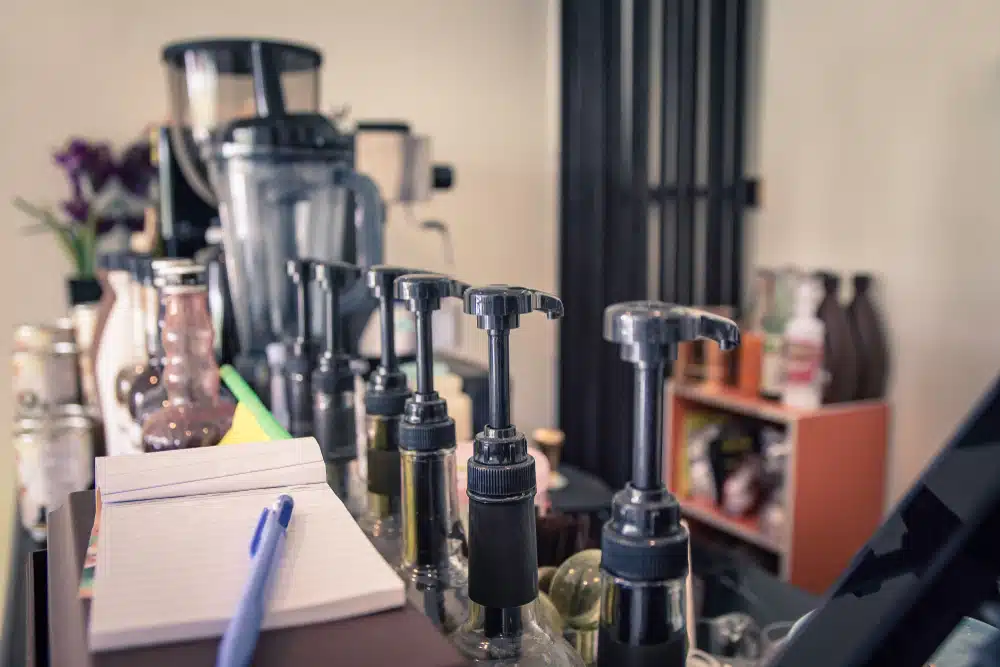
According to a July 2020 report from Research and Markets, the global coffee shop market is projected to be worth $237.6 billion by 2025. Coffee stands as the second most popular beverage globally, exerting a significant influence on our social interactions and daily routines.
To establish a thriving coffee shop, it’s crucial to stay abreast of industry trends, identify dependable wholesale partners, and procure top-quality accessories and supplies within your budget.
To aid you in this endeavour, we present a comprehensive coffee shop equipment list to kickstart your venture:
1. Automatic drip coffee makers
Price range: £30-£500
As black coffee typically forms a substantial portion of your café’s sales, the first item on your coffee shop equipment checklist should be a reliable coffee maker. Your chosen coffee maker must demonstrate durability to handle a high volume of daily production, efficiency to meet demand during peak hours (typically mornings), and capacity to brew sizable batches, thus averting the need for constant brewing throughout the day.
While it’s common for coffee shops to employ multiple coffee makers simultaneously, it’s advisable not to overextend yourself. Many successful café proprietors recommend maintaining three or four different blends at any given time to cater to varying tastes.
2. A high-quality espresso machine
Price range: £400 to £25,000
Espresso machines are pivotal for crafting many classic coffee beverages, making it essential to invest in a quality machine. However, navigating the expansive industrial espresso machine market can be daunting, especially considering the potential for higher prices. Understanding the key features that distinguish a good espresso machine and how to maximise value is paramount in your selection process.
3. An industrial coffee grinder
Price range: £500-£3,000
Given that many coffee shops prioritise freshness by using whole beans, incorporating an industrial coffee grinder into your equipment list is imperative. Choosing the appropriate grinder is pivotal for enhancing the flavour profiles and aroma of your coffee or espresso, underscoring the importance of investing wisely in this essential component.
4. POS system and website
Price range: £0 – £1,500
A Point of Sale (POS) system serves as more than just a sales terminal. It acts as a central hub for managing various aspects of your coffee shop business, including inventory tracking, business analytics, employee management, and payment processing.
In today’s digital age, a modern coffee shop requires a POS system capable of facilitating sales across multiple channels. This entails seamless integration with third-party delivery platforms, support for restaurant e-commerce stores, and online ordering functionalities, ensuring flexibility for your customers. A robust POS should streamline orders from online, phone, and in-person channels, maximising sales opportunities.
Furthermore, a quality POS system often includes user-friendly tools for setting up your coffee shop’s website and cultivating an email subscriber list, enabling you to expand your digital footprint and engage with your audience effectively.
5. Curbside pickup supplies
Curbside pickup has become an essential service for coffee shops, offering customers convenience and ease. To facilitate efficient curbside pickup operations, coffee shops require a range of supplies.
This includes sturdy and weather-resistant signage clearly indicating designated pickup areas, ensuring seamless navigation for customers. Additionally, thermal bags or insulated containers are indispensable for preserving the temperature and quality of freshly prepared beverages during transit from the counter to the customer’s vehicle.
Disposable cups with secure lids are essential for spill-free transportation, while disposable cutlery or stirrers provide added convenience for customers on the go. Lastly, implementing a reliable order management system or mobile app for curbside pickup scheduling and payment processing streamlines operations, enhancing the overall customer experience.
6. Milk and water
We took a slight departure from traditional equipment, but don’t underestimate the importance of the right liquids in perfecting your coffee offerings.
Milk: The type of milk used can significantly influence the taste of your coffee. Consider offering a variety, including dairy-free options like almond or oat milk, to cater to different preferences and dietary requirements.
Water: Often overlooked, water quality is crucial in coffee preparation. Investing in a high-quality filtration system can not only extend the lifespan of your espresso machine but also enhance the flavour of your coffee. Since coffee is primarily composed of water, ensuring optimal water quality is essential to achieving the perfect brew and safeguarding your equipment from potential damage caused by high mineral content.
7. Industrial blenders
Price range: £80-£25,000
When embarking on the journey of opening a new coffee shop, one pivotal decision revolves around whether to opt for new or used equipment. While many restaurateurs lean towards purchasing new, there are scenarios where used equipment could offer distinct advantages. This choice holds significant sway over your business’s financial stability, operational efficiency, and overall success.
Investing in new coffee shop equipment boasts numerous advantages. Firstly, you’ll acquire the latest technology, ensuring optimal efficiency and reliability. New machines often come with warranties, providing assurance and protection against unforeseen repairs or replacements. Furthermore, newer models may feature advanced functionalities and enhanced energy efficiency, translating to reduced long-term operating costs.
However, the primary drawback of buying new lies in the cost. For new coffee shop owners, the expense of acquiring brand-new machines can pose a considerable financial strain. This outlay could potentially impact the availability of funds for other critical aspects of the business, such as marketing, staffing, or decor.
Conversely, purchasing used coffee shop equipment presents a cost-effective alternative. Used items are typically available at a lower price point, enabling you to allocate more resources to other essential areas. In some instances, older equipment may be constructed from higher-quality materials and designed to withstand longer periods of use. Opting for used equipment can be advantageous if you intend to experiment with different concepts or are uncertain about the long-term viability of your business. It allows you to minimise initial investment and test the market before committing to expensive, brand-new machines.
However, the main drawback associated with used equipment is the potential for damage or reduced longevity. It’s crucial to meticulously inspect the condition of each item and ensure its proper functioning. Consider the potential costs of repairs and maintenance, as older equipment may necessitate more frequent attention. Additionally, used equipment may lack warranty coverage, heightening the financial risk in case of any issues.
Ultimately, the decision between new and used coffee shop equipment hinges on your unique circumstances and priorities. Take into account your budget, long-term plans, and risk tolerance. Striking a balance by investing in new equipment for critical areas, such as espresso machines, while opting for used items for less critical tools, could be a prudent approach.
What to do after completing your coffee shop equipment list
With your coffee shop equipment list sorted, you can now shift your attention to the myriad other aspects of launching a business: recruiting your team of cashiers and baristas, crafting the layout of your coffee shop floor, curating merchandise offerings, and establishing a distinctive brand identity.
Armed with the appropriate tools and equipment, your coffee shop is poised to lay down a solid foundation for success. By focusing on these crucial elements, you’re paving the way for your establishment to thrive and make a lasting impression on your customers.
Read more:
- Differences between Coffee Shops and Cafe’s
- Profitability of a coffee shop
- How much profit does a Coffee Shop make UK
- How to run a successful Coffee Shop
- Opening a coffee shop
Conclusion
Having the right coffee shop equipment is essential for running a successful and efficient operation. From the basics like coffee makers and espresso machines to specialized equipment like coffee grinders and blenders, each piece plays a crucial role in delivering high-quality beverages and food to your customers.
Additionally, investing in a reliable POS system, refrigeration units, and storage solutions ensures smooth operations and optimal freshness of ingredients. Other equipment, such as curbside pickup supplies and security systems, contribute to enhancing the overall customer experience and safeguarding your business.
By curating an essential coffee shop equipment list, you can set your coffee shop up for success and provide a memorable experience for your patrons.
Lee Jones is a seasoned Business Finance Specialist with over two decades of invaluable experience in the financial sector. With a keen eye for market trends and a passion for helping businesses thrive, Lee has become a trusted advisor to countless organizations seeking to navigate the complexities of finance.


